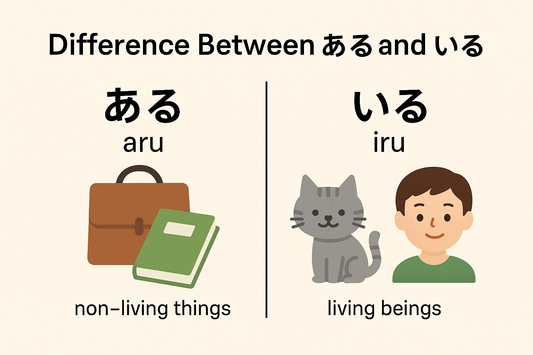Learn Japanese
JLPT N5 Kanji Quiz 1
Test your Japanese with this interactive JLPT N5 Kanji quiz! Practice reading and meaning with 10 essential kanji questions, instant feedback, and detailed explanations. Perfect for beginners and self-learners.
JLPT N5 Kanji Quiz 1
Test your Japanese with this interactive JLPT N5 Kanji quiz! Practice reading and meaning with 10 essential kanji questions, instant feedback, and detailed explanations. Perfect for beginners and self-learners.
JLPT N5: Common Vocabulary Mistakes
Some Japanese words at N5 level sound similar or have overlapping meanings, and it trips people up constantly. This guide covers the pairs that cause the most confusion, with examples...
JLPT N5: Common Vocabulary Mistakes
Some Japanese words at N5 level sound similar or have overlapping meanings, and it trips people up constantly. This guide covers the pairs that cause the most confusion, with examples...
Why is できました translated as ‘was created’ even though it isn’t the passive form?
A concise guide to why “dekimashita” is rendered as “was created” without passive voice, explaining resultative meaning, contrast with “tsukuru,” and natural translation choices in English.
Why is できました translated as ‘was created’ even though it isn’t the passive form?
A concise guide to why “dekimashita” is rendered as “was created” without passive voice, explaining resultative meaning, contrast with “tsukuru,” and natural translation choices in English.
JLPT N5 Opposite Words by Thematic Groups
Why learn opposite words in Japanese? Because they stick together in your memory and double your vocabulary instantly. When you learn 大きい (big), learning 小さい (small) at the same time...
JLPT N5 Opposite Words by Thematic Groups
Why learn opposite words in Japanese? Because they stick together in your memory and double your vocabulary instantly. When you learn 大きい (big), learning 小さい (small) at the same time...
Understanding ため, から and ので in Japanese: Purpose and Cause
This article explains the use of the Japanese particles tame, kara, and node, highlighting their different meanings and grammatical contexts for expressing purpose and cause. It includes examples and a...
Understanding ため, から and ので in Japanese: Purpose and Cause
This article explains the use of the Japanese particles tame, kara, and node, highlighting their different meanings and grammatical contexts for expressing purpose and cause. It includes examples and a...
The different notion of stop between kanji 止 (shi/tei) and 停 (tei)
Confused about when to use 止 versus 停 in Japanese? These two kanji both relate to stopping, but they have distinct meanings that can change your message completely. While 止...
The different notion of stop between kanji 止 (shi/tei) and 停 (tei)
Confused about when to use 止 versus 停 in Japanese? These two kanji both relate to stopping, but they have distinct meanings that can change your message completely. While 止...
Understanding ほど: 5 Key Uses with Clear Alternatives
Explore the 5 main uses of the Japanese particle “ほど” for expressing comparison, intensity, proportional relationships, approximation, and reference level, each with clear and natural alternatives in everyday Japanese.
Understanding ほど: 5 Key Uses with Clear Alternatives
Explore the 5 main uses of the Japanese particle “ほど” for expressing comparison, intensity, proportional relationships, approximation, and reference level, each with clear and natural alternatives in everyday Japanese.

What's the Difference Between ある (aru) and いる (iru)?
Confused between ある and いる in Japanese? This clear comparison article shows when to use each verb, with furigana and deeper insights on meaning.
What's the Difference Between ある (aru) and いる (iru)?
Confused between ある and いる in Japanese? This clear comparison article shows when to use each verb, with furigana and deeper insights on meaning.
JLPT N5 : Vocabulary (語彙) Quiz 1
Practice essential JLPT N5 vocabulary with this beginner quiz. Test your knowledge of basic Japanese words and phrases needed for everyday situations and the JLPT N5 exam.
JLPT N5 : Vocabulary (語彙) Quiz 1
Practice essential JLPT N5 vocabulary with this beginner quiz. Test your knowledge of basic Japanese words and phrases needed for everyday situations and the JLPT N5 exam.
Beginner Kanji & Vocabulary Quiz 1
Test your Japanese skills with this Beginner Kanji & Vocabulary Quiz! Practice reading kanji, understanding word meanings, and expanding your basic vocabulary. This quiz features a mix of questions inspired...
Beginner Kanji & Vocabulary Quiz 1
Test your Japanese skills with this Beginner Kanji & Vocabulary Quiz! Practice reading kanji, understanding word meanings, and expanding your basic vocabulary. This quiz features a mix of questions inspired...
